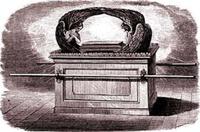Articles in the Ark of the Covenant:
What may seem strange to us today is that, hidden in the special golden box representing God’s presence were not treasures and precious gems, but three unlikely items: a jar of bread, a stick and two stones. What were these curious keepsakes and why did God want them in His ark?
The three articles represented some of the most embarrassing and disgraceful events in the history of the Israelites.
First, the pot of manna:
God had provided this bread-like food for the Israelites when they grumbled during the wanderings in the desert. It was bread from heaven! He continued to provide the food daily and faithfully, but the people were not one bit thankful. They complained and wanted something else. The pot of manna was an uncomfortable reminder that despite what God had provided for them, the Israelites had rejected God’s provision.
Second, Aaron’s staff that had budded: The people, out of jealousy, rebelled against Aaron as their high priest. To resolve the dispute, God commanded the people to take 12 sticks written with the names of the leader of each tribe and place them before the ark overnight. The next day, Aaron’s rod from the house of Levi had budded with blossoms and almonds. God confirmed his choice of Aaron’s household as the priestly line.
The Israelites had said heartily, “All that the Lord has spoken we will do,” in response to God’s covenant (Exodus 19:8). But how did they fare in fulfilling their end of the contract? Miserably. It was impossible for them to keep the Ten Commandments perfectly. Over and over again, they violated God’s holy Law, and God made it clear to them the consequences of their sin by sending plagues, natural hazards and foreign armies upon them. The stone tablets in the ark were a reminder that the Israelites had rejected God’s right standard of living.
These three articles were preserved in the ark throughout Israel’s history as an unpleasant symbol of man’s sins and shortcomings, a reminder of how they rejected God’s provision, authority and right standard of living. It pointed to man as a helpless sinner.
It may have been uncomfortable to think that God’s splendor was so close to the three articles associated with man’s sinfulness. But this is where God’s provision comes in.
When God looked down from His presence above the ark, He did not see the reminders of sin. They were covered by a necessary object — the atonement cover.
Every year, the high priest would enter the Holy of Holies on the Day of Atonement. Bringing burning incense to shield his eyes from a direct view of God’s glory, he sprinkled blood from a bull onto the atonement cover for his and his household’s sins, then sprinkled blood from a goat for all the sins of Israel. God promised that when He saw the blood, it would cover over man’s sin. (To atone for means to cover over — hence the name atonement cover.) God did not see the sin anymore but the provision instead, and it appeased His wrath.
The Israelites found acceptance with God by believing His word to be true — that when their sins were covered by blood, God temporarily overlooked their sins as it they had been obliterated. But Jesus Christ has become our permanent atonement cover. Through Jesus’ blood, our sins have been covered over. When God looks at us, He doesn’t see our sin, but the provision: His own Son. Jesus lay down His life for us as an innocent sacrifice so that God would look on us and see His perfection.
The atonement cover was God’s throne in the midst of the Israelites. God is on His throne today in heaven and Jesus, our high priest, is at His right side. When we come to God now, we approach a throne of grace.
“Let us then approach the throne of grace with confidence, so that we may receive mercy and find grace to help us in our time of need.” (Hebrews 4:16)
The Atonement Cover:
“This is what the Lord has commanded: ‘Take an omer [portion for one man] of manna and keep it for the generations to come, so they can see the bread I gave you to eat in the desert when I brought you out of Egypt.’” (Exodus 16:32)

